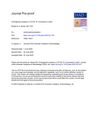Treatment of Androgenetic Alopecia by Exosomes Secreted From Hair Papilla Cells and the Intervention Effect of LTF
August 2023
in “
Journal of Cosmetic Dermatology
”
androgenetic alopecia exosomes hair papilla cells Liao Tuo Fang LTF cytokines growth factors minoxidil therapeutic formula hormone T E2 levels hyperandrogenic status VEGF AKT1 CASP3 apoptotic pathway hair regeneration DPC molecularly regulated exosomes androgenic alopecia Rogaine testosterone estrogen vascular endothelial growth factor protein kinase B caspase-3 dermal papilla cells

TLDR Exosomes from hair papilla cells and the Chinese medicine Liao Tuo Fang can potentially promote hair growth and could be used to develop hair growth drugs.
The study investigated the use of exosomes secreted from hair papilla cells and the intervention effect of a Chinese medicine compound, Liao Tuo Fang (LTF), in treating androgenetic alopecia. The research involved 25 mice and found that these exosomes, which contain potent cytokines and growth factors, showed promise in promoting hair growth. Significant hair regrowth was observed after two weeks of treatment with a therapeutic formula, minoxidil, and a therapeutic formula-exosome group. The study also found that all treated groups showed a decrease in hormone T levels and an increase in E2 levels, improving the hyperandrogenic status in blood. The LTF-EXO group promoted VEGF and AKT1 and decreased CASP3 expression more significantly, suggesting that LTF-EXO may inhibit the CASP3-mediated apoptotic pathway contributing to hair regeneration. Despite limitations such as the costly exosome isolation process and unsatisfactory quantities of exosomes produced, the study concludes that culturing DPC with molecularly regulated exosomes via LTF may be a potential candidate for developing hair proliferation-promoting drugs.
















